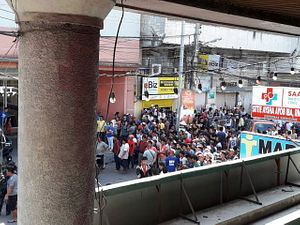Suspected Muslim militants remotely detonated a bomb near the entrance of a mall in the southern Philippines on Monday as people did last-minute shopping ahead of New Year’s Eve celebrations. The blast killed at least two and wounding nearly 30, officials said.
The bomb went off near a baggage counter at the entrance of the South Seas mall in Cotabato city, wounding shoppers, vendors, and commuters. Authorities recovered another unexploded bomb nearby as government forces imposed a security lockdown in the city, military and police officials said.
Superintendent Romeo Galgo Jr., the deputy police director of Cotabato, said witnesses saw a man leave a box in a crowded area near the mall’s entrance where vendors and shoppers were milling. The explosion shattered glass panels and scattered debris to the street fronting the mall.
Major General Cirilito Sobejana said by phone that an initial investigation showed the design of the bomb was similar to those used in the past by local Muslim militants who have pledged allegiance to the Islamic State (ISIS) group.
Two of the roughly 30 people hit by the blast died while being brought to a hospital, Sobejana said.
Government forces launched an offensive against the militants belonging to a group called Daulah Islamiyah last week and at least seven of the militants died in the fighting, Sobejana added.
“This is a part of the retaliation, but the problem is they’re victimizing innocent civilians,” he told reporters.
Cotabato Mayor Cynthia Guiani-Sayadi condemned the bombing and called on residents to help fight terrorism.
“This is not just another terroristic act but an act against humanity. I cannot fathom how such evil exists in this time of merry making,” she said.
“It is unimaginable how some people can start the new year with an act of cruelty but no matter how you threaten us, the people of Cotabato are resilient… We will stand up against terrorism,” she told reporters.
The bombing, the latest in a number of attacks blamed on militants in the volatile region, occurred despite on-and-off military assaults against pockets of militant groups operating in the marshlands and hinterlands not far from Cotabato and outlying provinces.
As Michael Hart previously explained for The Diplomat, the use of improvised explosive devices (IEDs) has been on the rise in the southern Philippines since the siege of Marawi city in 2017. “The use of IEDs was a key tactic employed by the ISIS-aligned Maute group as they laid siege to Marawi from May to October [2017], and this trend has continued across Mindanao since the jihadist uprising was extinguished by the Philippine military,” Hart wrote. He noted that pressure from the Philippine military was preventing more conventional armed attacks, making IED attacks an attractive option for increasingly desperate ISIS-linked groups.
Hundreds of militants aligned with the Islamic State group laid siege in the southern Islamic city of Marawi in May 2017, sparking five months of intense fighting and military airstrikes that left more than 1,100 mostly militants dead and displaced hundreds of thousands of villagers.
President Rodrigo Duterte placed the southern third of the country under martial law to deal with the Marawi siege, the worst security crisis he has faced since taking office in mid-2016.
The militants are opposed to a Muslim autonomy deal signed by the biggest Muslim rebel group and the government. There are concerns that radical groups may carry out bombings and other attacks to derail a January 21 regional plebiscite aimed at obtaining public approval of a new law establishing a more powerful Muslim autonomous region in the south.
By the Associated Press, with additional reporting by The Diplomat.

































